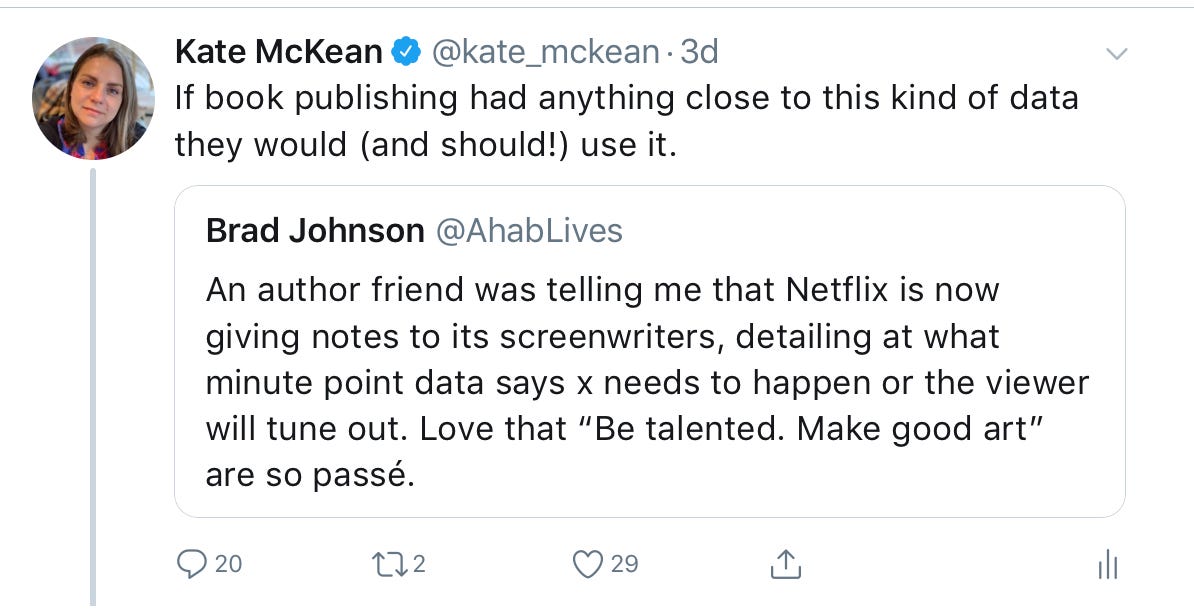Did you see me, DongWon Song and Kelsey McKinney featured on the Substack blog last week? Besides them totally trolling me and DongWon, as we are in a battle royale for subscribers, it included a link for a ~~**~*~DISCOUNT!~*~*~~* Follow this link for 20% an annual subscription to this, and the others’, newsletters!
Hi friends,
So last week, I wrote the following:

I kinda knew it would, ahem, generate some discussion, but I also believe it. GIVE ME ALL THE DATA. If there’s data, I want it. If someone could tell me readers got bored around page 37 of my book, I would definitely go in and try to make that part better! Of course, I wouldn’t make these changes in a vacuum. I’d obviously consider how they would affect the whole book, but aren’t we always bitching that we just want someone to tell us what’s wrong with out books???
Commenters on Twitter felt a little differently. Many felt that the ~~ROBOTS WERE COMING FOR OUR ART~~~. (Yes, I’m being a little flippant and sarcastic here, but I do respect and understand this point of view.) Maybe how I hope/want this data to be used in book publishing is idealistic (and unlikely?) but I don’t agree that any significant advances in technology will only be used for evil. Some will use it for evil, but YOU don’t have to use it for evil.
Here’s how I hope it’s used: I hope that book publishers gain access, and share with authors as relevant, to reading data from the services that enable ebook reading (because they don’t have access to that data directly) to get real, actual, reader-focused, industry data. I want data on what readers do while they’re reading and what they do after they stop. Maybe this data will tell us that people often pre-order books, but they don’t actually read them for two weeks after purchase. Maybe they will find that for every 1,000 words over 90,000 words, the percentage of people finishing a book decreases by 4%—for mystery readers, but there’s no affect on science fiction readers. (And maybe they find that finishing the book has nothing to do with whether the reader buys the next book.) Maybe they find that books with more chapter breaks lead to higher completion rate. Maybe they find that romance readers are more likely to buy books on the first Tuesday of the month. There are so many ways any kind of reader data could help ***sell more books.***
Because that’s what I hope it does. I don’t think this data will help us write better books, because better to who? That subjective. I think this kind of data can help writers with their actual stories I think it’s valuable to know that many readers get bored a third of the way through!!!!—or whatever thing I made up as an example. Does that mean the whole book is better? ¯\_(ツ)_/¯ Who knows? The difference between my example and what people were afraid of is the compulsory aspect. You wouldn’t HAVE to do this, but you could.
Here’s how I hope it’s NOT used: I hope that book publishers do NOT require that books have an action scene on page 37. That books never be longer than 65,574 words long. That every romance has 43 chapters and every fantasy novel has 89. This would be the robots coming for our art. I don’t want that. To be honest, there are too many smart people in (most of) publishing to think that this would actually create better books and more sales. Fear of technology, especially when it comes to something as important as our own books, is normal and understandable. But fear that holds back the chance of better information is not going to help publishing. And publishing needs all the help it can get.
Smart commenters on Twitter noted that this data represents what an actual editor does. They are CORRECT! Smart editors know that books sometimes lag as you get closer to the middle. Smart editors know that reader fatigue is a real thing and your book should be as long as it needs to be (and no longer). Smart editors learn this from experience and make judgements based on that experience. Editors are amazing and should not be replaced by computers.
But you know what? Editors and data could work at the SAME TIME! And the writer could help too! It’s a revolutionary concept, but getting a group of people together to make a book better could really work! (Yes, that’s sarcasm again.)
There are exactly zero things that work the same way for all books. There’s no one way to write them, publish them, market them, or sell them. There would be no one way to use any reader based data on all books, and publishers should not approach it that way. But I do hope we get data like that one day. Hell, I want to know where most of you stopped reading this newsletter, no less my 80k word novel. I, for one, welcome our new book robot overlords.
Feel free to tell me how wrong you think I am in the comments. That’s what they’re there for.
OXOXO,
Kate



This sort of data is already being mined by publishers - see thepigeonhole.com, for example, which provides reader analytics showing how readers progress or abandon a book through its serialisation into several 'staves'. (Side note: I'm an editor, so despite a great interest in books and 'big data', I'm also feeling my neck somewhat!)